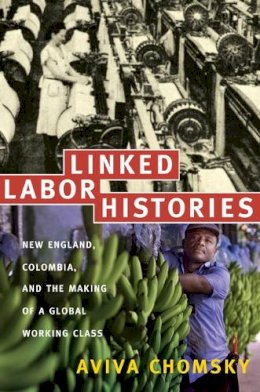
Linked Labor Histories: New England, Colombia, and the Making of a Global Working Class
Aviva Chomsky
Chomsky examines labor and management at two early-twentieth-century Massachusetts factories: one that transformed the global textile industry by exporting looms around the world, and another that was the site of a model program of labor-management collaboration in the 1920s. She follows the path of the textile industry from New England, first to the U.S. South, and then to Puerto Rico, Japan, Mexico, Central America, the Caribbean, and Colombia. She considers how towns in Rhode Island and Massachusetts began to import Colombian workers as they struggled to keep their remaining textile factories going. Most of the workers eventually landed in service jobs: cleaning houses, caring for elders, washing dishes.
Focusing on Colombia between the 1960s and the present, Chomsky looks at the Urabá banana export region, where violence against organized labor has been particularly acute, and, through a discussion of the AFL-CIO’s activities in Colombia, she explores the thorny question of U.S. union involvement in foreign policy. In the 1980s, two U.S. coal mining companies began to shift their operations to Colombia, where they opened two of the largest open-pit coal mines in the world. Chomsky assesses how different groups, especially labor unions in both countries, were affected. Linked Labor Histories suggests that economic integration among regions often exacerbates regional inequalities rather than ameliorating them.
Product Details
About Aviva Chomsky
Reviews for Linked Labor Histories: New England, Colombia, and the Making of a Global Working Class
Robert O’Brien
Canadian Journal of Latin American and Caribbean Studies
“Chomsky’s study provides very interesting insights into the workings of American imperial expansion over the course of the twentieth century.”
Cary Fraser
Hispanic American Historical Review
“The ambitious linkage of Colombia’s and New England’s labor histories is sustained by her understanding of the nature of capitalism. [Chomsky’s] approach is thought-provoking and reminiscent of the work of Charles W. Bergquist, though with much greater attention to the struggles of local activists. This book merits a close reading and, one hopes, will inspire others to undertake similar studies.”
David Sowell
American Historical Review
“Linked Labor Histories clearly establishes Chomsky as one of the foremost innovative labour historians of América—North and South.”
David C. Carlson
Canadian Journal of History
“Linked Labor Histories is a book with a story that scholars can certainly learn from, but it has an even more important message to concerned citizens and labour activists about the necessity of building a movement that confronts globalisation with global strategies.”
James P. Brennan
Journal of Latin American Studies
“Linked Labor Histories is an informative, thought-provoking explanation of how workers’ struggles within the imperialist centers are linked to those in countries dominated by imperialism.”
Ted Zuur
Socialism and Democracy
“[A] valuable contribution in the movement to revive (and revise) analytical tools that shed light on the past in order to illuminate the paths we walk today.”
Louis Segal
A Contracorriente
“Chomsky challenges readers to rethink their assumptions about regional and global power relations, as well as the parts played by governments, workers, and their unions in capital’s continual search for cheap, controllable labor. . . . Aviva Chomsky has written an exciting book about globalization and how the creation and maintenance of global inequalities over time have empowered capital over labor. . . . Chomsky’s work explores new avenues of inquiry. She pushes readers to engage with the long history of the global South, and consider the strategies workers, unions, corporations, consumers, and governments have used to shape its development in the past, and the ways they could do so in the future.”
Beth English
Labor
“What in many text books easily turns into a dry account becomes in Chomsky’s skilful narrative a fascinating and lively story, where the personal is never far from the general. In particular, I like the way in which each of the seven chapters ends with snippets of life histories from workers and unionists, whose personal experiences reflect the more abstract development of global capitalism. It is this putting flesh on social history that makes Linked Labor Histories such a captivating read. . . . Linked Labor Histories is a tremendous achievement and a fascinating read.”
Ulrich Oslender
Bulletin of Latin American Research
